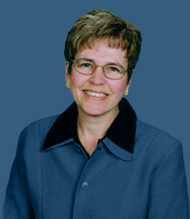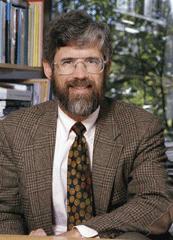Rock Star Science Team
Air Date: Week of January 9, 2009

Jane Lubchenco is a professor of marine biology at Oregon State University and a former president of the American Association for the Advancement of Science. (Photo: Denny Wolverton)
Barack Obama has selected some of the most accomplished scientists in the United States to lead major departments of the government. Host Steve Curwood talks with Stanford professor Steven Schneider about the newly nominated science advisor, Secretary of Energy, and head of National Oceanic and Atmospheric Association.
Transcript
CURWOOD: From the Jennifer and Ted Stanley Studios in Somerville, Massachusetts - this is Living on Earth. I’m Steve Curwood.
Not since George Washington could consult with Benjamin Franklin has a U.S. leader had such a star-studded science team as President-elect Barack Obama. Among the leading scientists Obama is presenting for senate confirmation are two Nobel Laureates, two former presidents of the AAAS – that’s the American Association for the Advancement of Science, the director of a national science lab and the credentials go on.

John Holdren shared the 1995 Nobel Peace Prize and is director of the Woods Hole Research Center and a Harvard professor. (Photo: © Martha Stewart)
SCHNEIDER: Thank you, Steve. It’s good to talk to you again.
CURWOOD: Steve, let’s first talk about Dr. John Holdren, Obama’s pick for White House Science Advisor. He’s a Harvard professor of environmental policy and director of the Woods Hole Research Center. And he chaired a group that won the Nobel Peace Prize for nuclear disarmament. Here’s a bit of tape from him talking about climate change.
HOLDREN: I think most people, even most scientists, continue to underestimate how far down the path to climate catastrophe we’ve already traveled. We’re seeing more heat waves. We’re seeing more droughts. Major floods are up all over the world.
CURWOOD: Dr. Holdren sounds pretty strong on climate change. In fact, in the past when I interviewed him about climate change, he said, “No, Steve, it is climate disruption.” What do you think are his strengths and weaknesses?
SCHNEIDER: Well John Holdren’s in my top ten smartest people in the world. There’s no topic in science except in the bio-med area that he doesn’t have a broader view than most of the professionals practicing. So it’s a perfect choice for a science advisor because they don’t need somebody there who’s producing the latest results in the melt rates of the ice in Greenland. They need somebody who sees how that fits into sea level rise and what that does to coastal wetlands. And he’s going to get push back from people saying “Oh, but John, you can’t be sure.” And I know what he’ll say. He says “Well, are you sure your house is going to burn down? You have insurance. We’re not sure who’s going to attack us. We have a trillion dollar military.” And I think he’s going to use exactly those kinds of arguments to try to have us hedge against potentially catastrophic outcomes in the environment. We have to recognize where are the risks and deal with 'em.
CURWOOD: Now let’s talk about Steven Chu next. He’s Barack Obama’s choice for Secretary of Energy. He is a director of the Lawrence Berkeley National Laboratory and also a Nobel Laureate. In this case, he won the Nobel Prize in physics. Let’s listen a moment now to Steven Chu talk about energy issues.

Steven Chu is the Director of the Lawrence Berkely National Laboratory and the 1997 recipient of the Nobel Prize in physics. (Courtesy of Lawrence Berkely National Laboratory)
SCHNEIDER: We’ll Steve Chu is another one of those brilliant intellectuals, and I was actually surprised five years ago when he left us here at Stanford and went over to the dark side to Berkeley. But he did it to run as the administrator for the Lawrence Berkeley National Lab, which is arguably the Mecca of renewable energy, energy efficiency. So, Steve is not just talking the talk, but he’s actually for the last five years walked the walk of being involved daily with people who actually look at renewable energy technology. He’ll be a refreshing change in the Department of Energy, which in the past has often been run by managers. Here you’re going to have a guy with some management experience, but who’s an intellectual first. And I think that’s critical also to be in the cabinet.
CURWOOD: Now let’s talk about Jane Lubchenco, she was president of the AAAS, the American Association for the Advancement of Science.
She was one of the nations leading marine biologists, professor out of Oregon State University now, but she has been tapped to head NOAA, the National Oceanic and Atmospheric Administration. Let’s take a listen to some archive tape of Jane Lubchenco.

Jane Lubchenco is a professor of marine biology at Oregon State University and a former president of the American Association for the Advancement of Science. (Photo: Denny Wolverton)
SCHNEIDER: Jane Lubchenco is again a refreshing change, because NOAA has been headed primarily by administrative types. Now we’re bringing in a world class scientist who also has the value system which says 'nature matters too.' It’s not just about improving the economy. Remember, NOAA sits in the Department of Commerce. So, the people at the top always have the 'what’s it gonna do for the economy?' point of view. Jane is gonna bring in 'but what is it doing to the environment at the same time?'
CURWOOD: So, Professor Schneider, look into your crystal ball now, and what do you see in that ball of what this group of people will have been able to accomplish over the next four or eight years?
SCHNEIDER: I think first of all they’ll change the culture within the government.. There’s this knee jerk 'how much is it going to cost and what are our campaign contributors going to say?' That’s not how John Holdren, or Steve Chu or Jane Lubchenco think. They think, 'what’s it going to do to species? How is it going to lower the price of solar or wind or make nuclear safer?' It’s going to take them probably the better part of the first administration to get that cultural change. It’s a terrific set of choices, but they will have their hands full trying to change the culture in Washington D.C.
CURWOOD: Steven Schneider is a professor of biology at Stanford University. He’s also co-director of the Center for Environmental Science and Policy at Stanford. Thank you so much, Steve.
SCHNEIDER: Thanks, Steve. It’s always good to talk to you.
Links
For more on Jane Lubchenco, click here
Learn more about Steven Chu from the Lawrence Berkeley National Laboratory
Living on Earth wants to hear from you!
Living on Earth
62 Calef Highway, Suite 212
Lee, NH 03861
Telephone: 617-287-4121
E-mail: comments@loe.org
Newsletter [Click here]
Donate to Living on Earth!
Living on Earth is an independent media program and relies entirely on contributions from listeners and institutions supporting public service. Please donate now to preserve an independent environmental voice.
NewsletterLiving on Earth offers a weekly delivery of the show's rundown to your mailbox. Sign up for our newsletter today!
 Sailors For The Sea: Be the change you want to sea.
Sailors For The Sea: Be the change you want to sea.
 Creating positive outcomes for future generations.
Creating positive outcomes for future generations.
 Innovating to make the world a better, more sustainable place to live. Listen to the race to 9 billion
Innovating to make the world a better, more sustainable place to live. Listen to the race to 9 billion
 The Grantham Foundation for the Protection of the Environment: Committed to protecting and improving the health of the global environment.
The Grantham Foundation for the Protection of the Environment: Committed to protecting and improving the health of the global environment.
 Contribute to Living on Earth and receive, as our gift to you, an archival print of one of Mark Seth Lender's extraordinary wildlife photographs. Follow the link to see Mark's current collection of photographs.
Contribute to Living on Earth and receive, as our gift to you, an archival print of one of Mark Seth Lender's extraordinary wildlife photographs. Follow the link to see Mark's current collection of photographs.
 Buy a signed copy of Mark Seth Lender's book Smeagull the Seagull & support Living on Earth
Buy a signed copy of Mark Seth Lender's book Smeagull the Seagull & support Living on Earth

